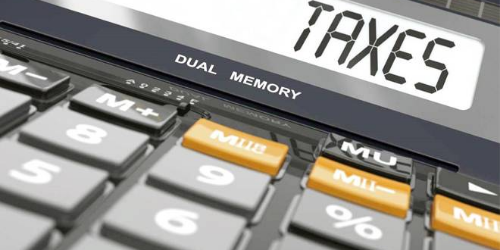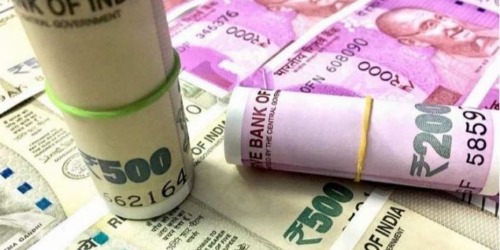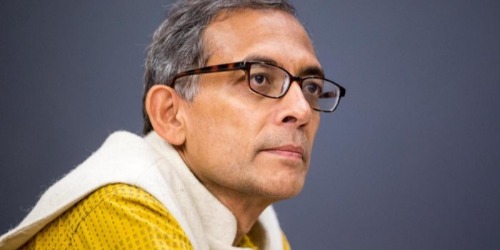Govt's tax collection in H1 2019-20 only 37% of Budget; lowest in 5 years

Reflecting an overall decline in economic activity, data from Controller General of Accounts says the net tax collection as of September 30 is lowest in the past five years. The government collected Rs 6.07 lakh crore tax till September, far below its Budget target of Rs 16.49 lakh crore, as per the Controller General of Accounts (CGA) data.
The Centre had collected 39.4 per cent (Rs 5.8 lakh crore) of the total target of Rs 14.8 lakh crore in 2018-19; 44.2 per cent (Rs 5.4 lakh crore) of total target of Rs 12.2 lakh crore in 2017-2018; 42.5 per cent (Rs 4.4 lakh crore) of total target of Rs 10.5 lakh crore in 2016-2017; and 40.2 per cent (Rs 3.2 lakh crore) of total target of Rs 8.7 lakh crore.
The net collection of both direct and indirect taxes have seen a significant decline. The government has collected total corporate tax of Rs 2.49 lakh crore this year so far, which is less than one-third of its full-year target of Rs 7.66 lakh crore. Finance Minister Nirmala Sitharaman's announcement of over 7 per cent reduction in corporate tax to 25 per cent would lead to further fall in tax revenue collection.
Personal tax collection till September 30 is over one third (Rs 2.13 lakh crore) of the total target of Rs 5.69 lakh crore for the fiscal year. The CGST (central goods and services tax) so far seems to be in sync -- at Rs 2.47 lakh crore -- with the government's full-year estimate of Rs 5.26 lakh crore.
The lower tax collection means the government may fail to meet its fiscal deficit target of 3.3 per cent of the GDP. India's deficit for the April-September quarter stood at 95.3 per cent of the 2018-19 budget estimate (BE) in the same period last year. In absolute terms, the fiscal deficit, which is the gap between expenditure and revenue, stood at Rs 6,51,554 crore as on September 30, 2019. The government had kept the fiscal deficit target for the current financial year at Rs 7.03 lakh crore, which is equivalent to 3.3 per cent of the gross domestic product (GDP).
All these numbers indicate a persistent slowdown in the economy. In the first quarter of FY20, GDP growth slumped to a six-year low of 5 per cent. Private consumption decelerated to an 18-quarter low of 3.1 per cent in the June quarter.
- 0
- Leave a comment
India's unemployment rate rises to 3-year high of 8.5% in October: CMIE

India's unemployment rate rose to a three-year high of 8.48 per cent in October, up from 7.2 per cent in September, says the data released by the Centre for Monitoring Indian Economy (CMIE) on Friday. The unemployment rate for the month is highest since August 2016, reflecting an overall economic downturn in the country. The unemployment rate in September was 7.16 per cent, while it was 8.19 per cent in August. The last time the unemployment rate was higher was in August 2016 at 9.59 per cent.
However, employment in India increased by 25 lakh between May and September 2019, the CMIE data said. As per CMIE data, an estimated 40.49 crore persons were employed in India during May-August 2019, compared to 40.24 crore people employed during these months a year ago. This translates to 25 lakh additional jobs, indicating a healthy sign because during the same period in the last two years employment had fallen. "Employment during May-August 2018 was 55 lakh lower than it was in May-August 2017 which, in turn, was 6 lakh lower than it was in May-August 2016," the CMIE report highlighted.
According to CMIE, if labour continues to face a rising unemployment rate, and poor employment opportunities, it may start getting discouraged from entering the labour markets.
Meanwhile, output of eight core infrastructure industries contracted by 5.2 per cent in September, the lowest in the decade. As many as seven of the eight core industries saw a contraction in output in September. Coal production fell steeply by 20.5 per cent, crude oil by 5.4 per cent, and natural gas by 4.9 per cent. Refinery products (-6.7 per cent), cement (- 2.1 per cent), steel (-0.3 per cent), and electricity (-3.7 per cent) output too declined.
Congress to hold 10-day protest against Modi govt over economic slowdown

The Congress will hold nationwide protests against the Narendra Modi government over economic slowdown in the country from November 5 to November 15. "The party will raise issues surrounding the Regional Comprehensive Economic Partnership (RCEP), current economic crisis, mounting unemployment, spiralling price rise, bank frauds, job losses in public and private sectors, and farm distress," Congress General Secretary KC Venugopal said in a statement.
The protests will first be held across state capitals and will culminate in a massive protest in Delhi in November-end. All state-level party workers, PCC presidents, CLP leaders and senior AICC functionaries will take part in the agitation.
"Congress party workers and its volunteers will raise the voice of the people and try to make this insensitive Central government accountable for the countless miseries and sufferings that it is causing," the statement said.
In this regard, Congress President Sonia Gandhi will chair a meeting of AICC general secretaries, state in-charges, heads of frontal organisations and departments on November 2. The party has deputed a total of 31 senior Congress leaders and observers across states/UTs to monitor the agitation.
Ahead of the party's mega protest against the Modi government, former Congress chief Rahul Gandhi has left for a foreign trip. However, Gandhi will return to India in first week of November, reported ANI. Recently, BJP chief Amit Shah had also taken a jibe at Rahul Gandhi for being on "holiday" during Assembly elections.
7th Pay Commission: Modi govt makes big announcement for J&K, Ladakh; 4.5 lakh employees to benefit

In a big announcement, the Modi government has said all government employees of the Union Territories of Jammu and Kashmir and Ladakh will get financial facilities as per the 7th Pay Commission's recommendations from October 31. The decision will help over 4.5 lakh government employees of these UTs. The government will bear around Rs 4,800 crore worth of cost due to the implementation of the 7th Pay Commission in the UTs.
"Union Home Ministry has issued orders in this regard. The move will benefit 4.5 lakh government employees, who are working in the existing state of Jammu & Kashmir, and will become the employees of UT of Jammu & Kashmir and UT of Ladakh from 31st October 2019," a government statement said.
Union Home Minister Amit Shah has also approved the proposal to pay all other allowances, including children education allowance, transport allowance, LTC, fixed medical allowance, to these employees, the government stated.
"The annual financial implication of 7th CPC allowances like children education allowance, hostel allowance, transport allowance, LTC, fixed medical allowance etc. in respect of 4.5 lakh Government employees of existing State of Jammu & Kashmir shall be Rs 4800 crore tentatively," said the statement.
The Modi government had passed the Jammu and Kashmir Reorganisation Bill, 2019, in Parliament in August, and had announced that all the financial facilities that are being given to the employees of other UTs -- as per the recommendations of 7th Central Pay Commission -- will soon be extended to the employees of Jammu & Kashmir and Ladakh.
"Reduce Centre's Equity": Abhijit Banerjee's Solution To Banking Crisis

Nobel laureate Abhijit Banerjee said today that the government's equity in public sector banks should be reduced to below 50 per cent in order to end fear psychosis among bankers.
"The banking crisis is frightening. We should worry about it. We should be more vigilant...One day the bank is fine and then suddenly it is in crisis...We should be able to stop the crisis much ahead before it happens," the renowned US-based economist said, addressing a press conference.
"We need some important and aggressive changes," he asserted.
The fear of investigation by the Central Vigilance Commission (CVC) in default cases had paralysed the banking system and bankers do not want to lend.
"Reducing government equity in public sector banks to under 51 per cent will take them out of the CVC's purview," he said.
Refusing to get into questions on the economy or any controversial topic, Dr Banerjee said in a meeting earlier in the morning, Prime Minister Narendra Modi had "cracked a joke" that the media was trying to trap him and "get him to say anti-Modi things".
Dr Banerjee shares the Nobel with Esther Duflo - they are married - and Michael Kremer.
His criticism of the state of the economy and the government's policies fueled a debate with BJP leaders like Union Minister Piyush Goyal hitting back sharply, calling him a "left-leaning" economist.
Against this backdrop, his meeting with the Prime Minister generated much interest.


